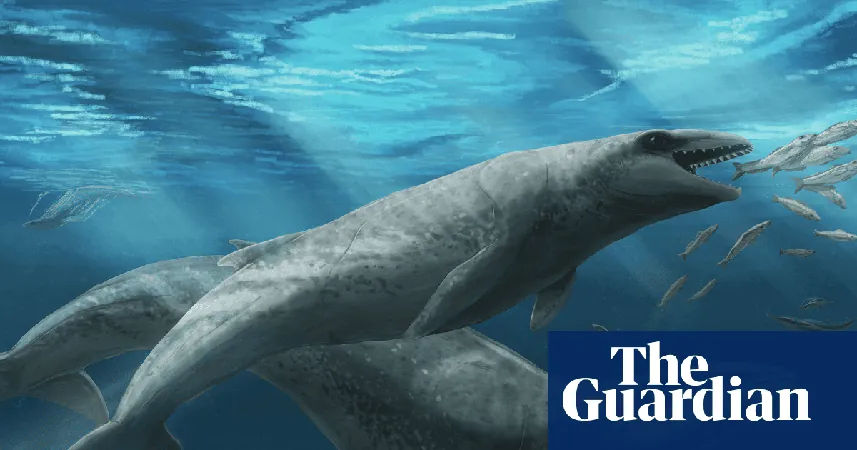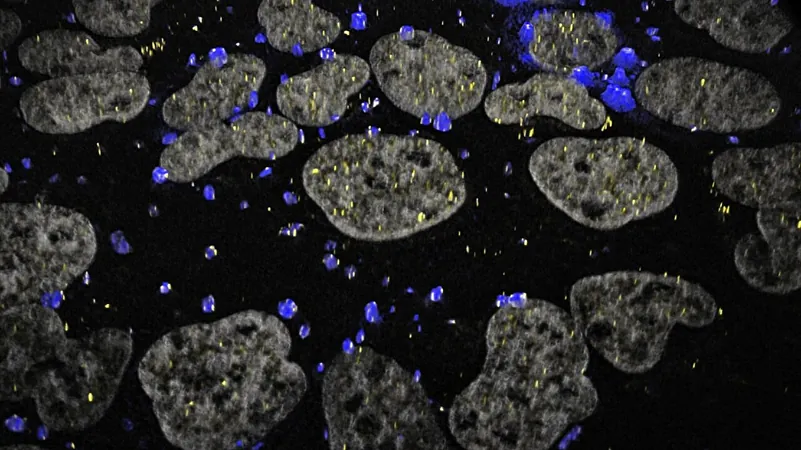
Meet the ‘Cute but Deadly’ Ancient Whale with Razor-Sharp Teeth Discovered in Australia!
2025-08-12
Author: Yu
A Jaw-Dropping Discovery on Victoria's Surf Coast
Scientists are buzzing over a startling fossil find: a new species of ancient whale described as "small and deceptively cute, but definitely not harmless." This astonishing creature, known as Janjucetus dullardi, dates back around 25 million years and was unearthed along Victoria’s picturesque surf coast.
The Shark-Like Cetacean
Dr. Erich Fitzgerald, a senior curator at Museums Victoria Research Institute, characterized this early whale as uniquely peculiar. Imagine a dolphin-sized creature flaunting razor-sharp teeth that put its modern relatives—majestic baleen whales like the blue whale—to shame. Instead of gentle filter feeding, Janjucetus was a fierce predator.
A Skull Built for the Hunt
Fitzgerald noted that this whale had a remarkably robust skull, termed "almost over-engineered." Its notable features included massive eyes, nearly the size of tennis balls, and a stout snout equipped with deeply rooted teeth, designed for gripping and tearing prey. Ruairidh Duncan, a researcher involved in the study, quipped, "This was a gnarly whale that I personally wouldn’t want to encounter in the water!"
Tiny but Deadly: What we know about Janjucetus dullardi
Estimated to reach lengths of about 3 meters when fully grown, the fossil analyzed was likely a juvenile, measuring around 2 to 2.2 meters—approximately the size of a beach towel! This discovery paints a vivid picture of life during the Oligocene epoch (30-23 million years ago), a warm period when seas were teeming with diverse marine life.
A Glimpse into Prehistoric Oceans
The fossil location, known as the Jan Juc Formation, hints at warmer seas akin to today’s subtropical waters off Australia. During this era, an abundance of aquatic life thrived, including giant penguins and massive sharks that dwarfed modern-day great whites. Fitzgerald remarked on the era's explosive diversification of marine mammals, offering a crucial look at evolutionary transitions.
Public Involvement in Scientific Discovery
This remarkable fossil wasn't just a science lab find; it was discovered by local school principal Ross Dullard, who stumbled upon it while strolling the beach in 2019. Understanding its significance, he generously donated the specimen to the museum, which honorably named the species after him. This showcases the vital role that everyday citizens can play in uncovering the wonders of paleontology.
A Legacy of Fossil Riches in Victoria
As Professor John Long, a Flinders University palaeontologist, emphasizes, this find could bridge gaps in understanding how early carnivorous whales evolved into the gentle giants we know today. With rich fossil heritage hiding just beneath the surface, Victoria offers a treasure trove for future discoveries—reminding us all that extraordinary fossils can often be found right in our own backyards.

 Brasil (PT)
Brasil (PT)
 Canada (EN)
Canada (EN)
 Chile (ES)
Chile (ES)
 Česko (CS)
Česko (CS)
 대한민국 (KO)
대한민국 (KO)
 España (ES)
España (ES)
 France (FR)
France (FR)
 Hong Kong (EN)
Hong Kong (EN)
 Italia (IT)
Italia (IT)
 日本 (JA)
日本 (JA)
 Magyarország (HU)
Magyarország (HU)
 Norge (NO)
Norge (NO)
 Polska (PL)
Polska (PL)
 Schweiz (DE)
Schweiz (DE)
 Singapore (EN)
Singapore (EN)
 Sverige (SV)
Sverige (SV)
 Suomi (FI)
Suomi (FI)
 Türkiye (TR)
Türkiye (TR)
 الإمارات العربية المتحدة (AR)
الإمارات العربية المتحدة (AR)